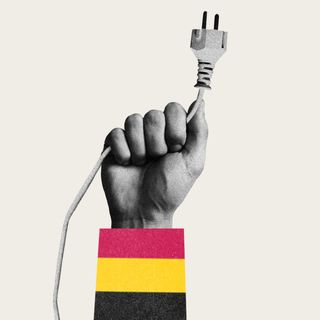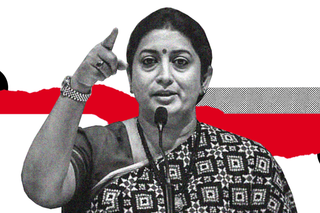
On Marital Rape, Minister of Women’s Development Says ‘Every Man Is Not a Rapist’
Officials misrepresenting the marital rape discourse frames it as a “men versus women” issue rather than a rights issue.

On Wednesday, the Union Minister of Women and Children’s Development Smriti Irani told the Rajya Sabha that condemning every man as a rapist and every marriage as violent is not desirable. Irani was responding to a parliamentary query regarding criminalizing marital rape in the country.
“Let me say, to condemn every marriage in this country as a violent marriage, and to condemn every man in this country as a rapist is not advisable in this august House,” Irani said. The government official responsible for looking after women’s rights later softened the claim with: “Protection of women and children in our country is a priority for all,” while going on to list the number of helplines and onestop-centers available to women.
She could not elaborate on the subject since it is currently under judicial hearing; a bench of the Delhi High Court is hearing petitions to strike down “Exception 2” in the rape law under Section 375 of the Indian Penal Code. The exception is not a trivial one: it states a man can forcibly have sexual intercourse with his wife without it being classified as rape, as long as the woman is not below 15 years of age.
In other words, Indian law doesn’t quite recognize marital rape as a criminal offense for now. Much like Irani’s, the arguments posited from the government have been in service of “protecting the institution of marriage” and/or preventing the “misuse” of gender-oriented laws. To quote the central government’s stance: the criminalization of marital rape “could open the floodgates of false cases being made with ulterior motives” and would be ill-suited in a country due to its high levels of illiteracy and cultural norms.
This raises the question: what happens when officials dedicated to women’s welfare make statements devoid of nuance and complexity? As parliamentary member Binoy Viswam said, such statements “not only seek to trivialize the issue of marital rape and domestic violence but are deeply insulting to the numerous women who have been subjected to this crime.” It remains important to note that striking down the exception will mean women take legal recourse to protect themselves from domestic violence and sexual abuse — scenarios they are very often unable to combat due to emotional, financial, and cultural stigma. However, the idea of women merely using laws meant to protect themselves is often framed as “misuse.”
For one, it misrepresents the debate around marital rape in this case in framing it as a “men versus women” issue rather than a rights-based issue. One of the arguments made in front of the Delhi High Court this week further stated: “The case before the court is about the moral right of a married woman to refuse unwanted forcible sexual intercourse and it is about respecting the right of a wife to say no and recognizing that marriage is no longer a universal license to ignore consent.” And “such an act will continue to remain condoned until it is explicitly declared an offense under the law.”
Irani’s statement frames marital rape as a far-left conspiracy to criminalize all men, rather than seeing it for what it is: protecting all women, even those who are married.
Related on The Swaddle:
Why It’s Still Legal For Indian Men to Rape Their Wives
Notably, it also misses much of the complexity lying at the core of marital rape cases. “It seems absurd to suggest that marriage can imply a universal irrevocable consent for sex and that without this, marriage cannot survive,” said a Supreme Court bench in 2019, of the “marriage will be destroyed if marital rape is criminalized” argument. The pillars of consent, integrity, bodily rights, andpersonhood of women are all sacrificed in the endless pursuit of protecting the holy grail of marriage. One then wonders: if criminalizing marital rape threatens marriage, is marriage inextricable from sexual violence?
This is despite telling numbers: one in every 25 women reported being subjected to sexual violence by theirhusbands often or sometimes, according to data from the National Family Health Survey-5 (NFHS-5), conducted in 2019-21. The number could be much higher as most cases go unreported.
Naturally, to Irani’s statement, a flood of supporting responses came along the lines of: “this marital rape propaganda raked up by leftist feminists in the name of women’s safety is actually a well planned desperate attempt to demolish the institution of marriage” or how it calls out the “misuse of “gender-biased laws.” Sadly, it seems to go amiss for some politicians and civil society members that the petition is against a license given to husbands to rape wives — an exception to the lawwhich some husbands are wildly misusing too.
We also have men’s rights organizations staging a protest against the criminalization of marital rape, welcoming the Indian government’s position so far. Just last week, #MarriageStrike was trending on Twitter as some felt their rights in marriage would be oppressed if marital rape would become a criminal offense. As a colleague commented about Irani’s recent statement: “this sounds like a statement circulated by an uncle on WhatsApp.”
Arguably, this is not the first time an organization or official in charge of women’s rights has overlooked the complexity of women’s issues. In June last year, a member of the National Commission of Women (NCW) had misguidedly claimed that “a woman should keep track of time, and should not venture out late. Perhaps, had the victim not gone out in the evening, or gone along with a family member, she could have been saved” from getting raped. This misogynistic rhetoric has been put forward by NCW even before. As The Swaddle reported back then: “It’s a remarkably tone-deaf and insensitive statement from a representative of a supposedly feminist organization, but sadly, not a wholly unexpected one.”
The insensitivity spills beyond women’s rights in some cases. In December last year, Smriti Irani, who is also responsible for children’s rights, shared a post on social media, which said, “When I was a kid, they didn’t take me to a psychologist… My mom was able to open my chakra, stabilize my karma, and clean my aura with one single slap.” She had to later take the post down following rightful criticism about how such rhetorics dismiss mental health and promote violence against children.
Language is a terribly powerful thing. When women’s welfare organizations and leaders ignore the complexities of our deeply patriarchal realities, and dismiss the emotional abuse and coercive acts of violence, it can defang the larger movement.
As Pallavi Prasad wrote in The Swaddle earlier: “The facts, logic, and precedents are all there to compel the State to do good by half the population of India, but until the mindsets of those in charge change to give importance to a different set of established arguments, little will change.”
Saumya Kalia is an Associate Editor at The Swaddle. Her journalism and writing explore issues of social justice, digital sub-cultures, media ecosystem, literature, and memory as they cut across socio-cultural periods. You can reach her at @Saumya_Kalia.
Related


Women Footballers in England Win Landmark Maternity Benefits
